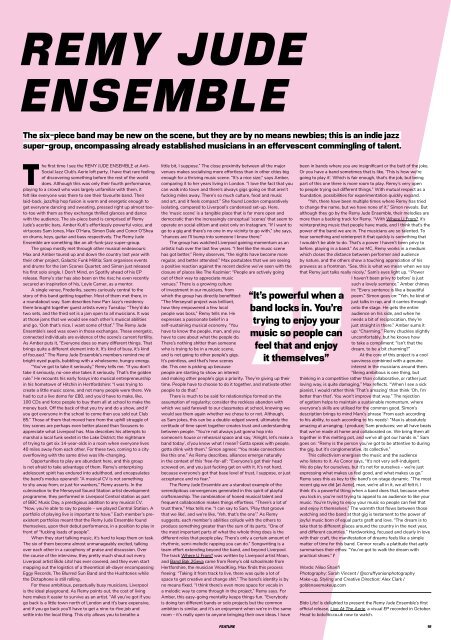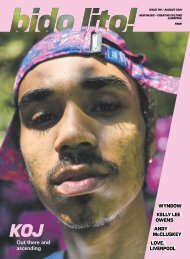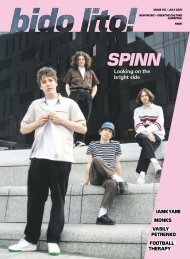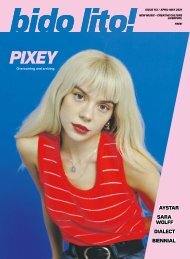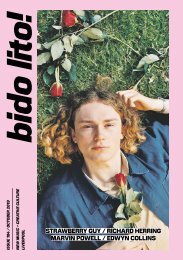Issue 95 / Dec18/Jan19
Dec 2018/Jan 2019 double issue of Bido Lito! magazine. Featuring: CHELCEE GRIMES, REMY JUDE ENSEMBLE, AN ODE TO L8, BRAD STANK, KIARA MOHAMED, MOLLY BURCH, THE CORAL, PORTICO QUARTET, JACK WHITE and much more.
Dec 2018/Jan 2019 double issue of Bido Lito! magazine. Featuring: CHELCEE GRIMES, REMY JUDE ENSEMBLE, AN ODE TO L8, BRAD STANK, KIARA MOHAMED, MOLLY BURCH, THE CORAL, PORTICO QUARTET, JACK WHITE and much more.
You also want an ePaper? Increase the reach of your titles
YUMPU automatically turns print PDFs into web optimized ePapers that Google loves.
REMY JUDE<br />
ENSEMBLE<br />
The six-piece band may be new on the scene, but they are by no means newbies; this is an indie jazz<br />
super-group, encompassing already established musicians in an effervescent commingling of talent.<br />
The first time I see the REMY JUDE ENSEMBLE at Anti-<br />
Social Jazz Club’s Aerie loft party, I have that rare feeling<br />
of discovering something before the rest of the world<br />
does. Although this was only their fourth performance,<br />
playing to a crowd who was largely unfamiliar with them, it<br />
felt like everyone was there to see their favourite band. Their<br />
laid-back, jazz/hip hop fusion is warm and energetic enough to<br />
get everyone dancing and sweating, pressed right up almost toeto-toe<br />
with them as they exchange thrilled glances and dance<br />
with the audience. The six-piece band is comprised of Remy<br />
Jude’s acerbic bars, Amber Kuti’s effortlessly powerful voice, and<br />
virtuosos Sam Jones, Max O’Hara, Simon Dale and Conor O’Shea<br />
on drums, keys, guitar and bass respectively. The Remy Jude<br />
Ensemble are something like an alt-funk-jazz super-group.<br />
The group mostly met through other musical endeavours:<br />
Max and Amber toured up and down the country last year with<br />
their other project, Galactic Funk Militia; Sam organises events<br />
and drums for the Jam Scones Quartet; and Simon just released<br />
his first solo single, I Don’t Mind, on Spotify ahead of his EP<br />
release. Remy’s star has also been on the rise; he even recently<br />
secured an inspiration of his, Loyle Carner, as a mentor.<br />
A single venue, Frederiks, seems curiously central to the<br />
story of this band getting together. Most of them met there, in<br />
a roundabout way. Sam describes how Parr Jazz’s residency<br />
there brought together guest artists every Tuesday: “They’d do<br />
two sets, and the third set is a jam open to all musicians. It was<br />
at those jams that we would see each other’s musical abilities<br />
and go, ‘Ooh that’s nice, I want some of that’.” The Remy Jude<br />
Ensemble’s seed was sown in those exchanges. These energetic,<br />
connected individuals are evidence of the scene’s current fertility.<br />
As Amber puts it, “Everyone does so many different things. That<br />
brings quite a different element into it. It’s kind of busy, it’s kind<br />
of focused.” The Remy Jude Ensemble’s members remind me of<br />
bright-eyed pupils, bubbling with a wholesome, hungry energy.<br />
“You’ve got to take it seriously,” Remy tells me. “If you don’t<br />
take it seriously, no-one else takes it seriously. That’s the golden<br />
rule.” He recounts his early forays into musical entrepreneurship<br />
in his hometown of Hitchin in Hertfordshire: “I was trying to<br />
create a little music scene, and not many people were there. We<br />
had to cut a live demo for £80, and you’d have to make, like,<br />
100 CDs and force people to buy them all at school to make the<br />
money back. Off the back of that you try and do a show, and if<br />
you got everyone in the school to come then you sold out Club<br />
85.” Those of them that moved here from the uphill struggle of<br />
tiny scenes are perhaps even better placed than Scousers to<br />
appreciate what Liverpool has. Max describes his attempts to<br />
marshal a local funk sextet in the Lake District; the nightmare<br />
of trying to get six 14-year-olds in a room when everyone lives<br />
40 miles away from each other. For these two, coming to a city<br />
overflowing with the same drive was life-changing.<br />
Opportunities to play are abundant here, and this group<br />
is not afraid to take advantage of them. Remy’s enterprising<br />
adolescent spirit has endured into adulthood, and encapsulates<br />
the band’s modus operandi: “A musical CV is not something<br />
to shy away from, or just for wankers,” Remy asserts. In the<br />
culmination to the Merseyrail Sound Station artist development<br />
programme, they performed in Liverpool Central station as part<br />
of BBC Music Day, a prestigious addition to any musical CV.<br />
“Now, you’re able to say to people – we played Central Station. A<br />
portfolio of playing live is important to have.” Each member’s preexistent<br />
portfolios meant that the Remy Jude Ensemble found<br />
themselves, upon their debut performance, in a position to play in<br />
front of “fucking loads of people”.<br />
When they start talking music, it’s hard to keep them on task.<br />
The six of them become almost unmanageably excited, talking<br />
over each other in a cacophony of praise and discussion. Over<br />
the course of the interview, they pretty much shout out every<br />
Liverpool artist Bido Lito! has ever covered, and they even start<br />
mapping out the logistics of a theoretical all-dayer encompassing<br />
Eggy Records, The Blurred Sun Band and the Hushtones while<br />
the Dictaphone is still rolling.<br />
For these ambitious, perpetually busy musicians, Liverpool<br />
is the ideal playground. As Remy points out, the cost of living<br />
here makes it easier to survive as an artist. “All you’ve got if you<br />
go back is a little town north of London and it’s bare expensive,<br />
and if you go back you’ll have to get a nine-to-five job and<br />
settle into the local thing. This city allows you to breathe a<br />
little bit, I suppose.” The close proximity between all the major<br />
venues makes socialising more effortless than in other cities big<br />
enough for a thriving music scene. “It’s a nice size,” says Amber,<br />
comparing it to her years living in London. “I love the fact that you<br />
can walk into town and there’s always gigs going on that aren’t<br />
fucking miles away. There’s so much culture, food and music<br />
and art, and it feels compact.” She found London comparatively<br />
isolating, compared to Liverpool’s condensed set-up. Here,<br />
the ‘music scene’ is a tangible place that is far more open and<br />
democratic than the increasingly conceptual ‘scenes’ that seem to<br />
operate on social elitism and exist only on Instagram. “If I want to<br />
go to a gig and there’s no one in my vicinity to go with,” she says,<br />
“chances are I’ll bump into someone I know there.”<br />
The group has watched Liverpool gaining momentum as an<br />
artistic hub over the last few years. “I feel like the music scene<br />
has got better,” Remy observes, “the nights have become more<br />
regular, and better attended.” Max postulates that we are seeing<br />
a positive reaction against the recent decline we’ve seen with the<br />
closure of places like The Kazimier: “People are actively going<br />
out of their way to appreciate music<br />
venues.” There is a growing culture<br />
of investment in our musicians, from<br />
which the group has directly benefitted:<br />
“The Merseyrail project was brilliant,<br />
how they empowered a few local<br />
people was boss,” Remy tells me. He<br />
expresses a passionate belief in a<br />
self-sustaining musical economy. “You<br />
have to know the people, man, and you<br />
have to care about what the people do.<br />
There’s nothing shitter than someone<br />
who is trying to be in a music scene,<br />
and is not going to other people’s gigs.<br />
It’s pointless, and that’s how scenes<br />
die. This one is picking up because<br />
people are starting to show an interest<br />
and making other people’s gigs a priority. They’re giving up their<br />
time. People have to choose to do it together, and motivate other<br />
people to do that.”<br />
There is much to be said for relationships formed on the<br />
assumption of regularity; consider the reckless abandon with<br />
which we said farewell to our classmates at school, knowing we<br />
would see them again whether we chose to or not. Although,<br />
as Sam jokes, this can be a double-edged sword, ultimately the<br />
certitude of time spent together creates trust and understanding<br />
between people. “You’re not always just gonna hop into<br />
someone’s house or rehearsal space and say, ‘Alright, let’s make a<br />
band today’, d’you know what I mean? Gotta speak with people,<br />
gotta drink with them.” Simon agrees: “You make connections<br />
like this one.” As Remy describes, alliances emerge naturally<br />
in the context of this ‘free-for-all’: “Everyone’s got their head<br />
screwed on, and you just fucking get on with it. It’s not hard,<br />
because everyone’s got that base level of trust, I suppose, or just<br />
acceptance and no fear.”<br />
The Remy Jude Ensemble are a standout example of the<br />
serendipitous convergences generated in this spirit of playful<br />
craftsmanship. The combination of honed musical talent and<br />
frequent collaboration makes things effortless. “There’s a lot of<br />
trust there,” Max tells me. “I can say to Sam, ‘Play that groove<br />
that we like’, and we’re like, ‘Yeh, that’s the one’.” As Remy<br />
suggests, each member’s abilities collude with the others to<br />
produce something greater than the sum of its parts. “One of<br />
the most important parts of what the whole thing does is the<br />
different roles that people play. There’s only a certain amount of<br />
rhythmic, semi-melodic rapping you can do.” Songwriting is a<br />
team effort extending beyond the band, and beyond Liverpool.<br />
The track Where U From? was written by Liverpool artist Moon,<br />
and Band Bak 2Geva came from Remy’s old schoolmate from<br />
Hertforshire, the musician WoodKing. Max finds this process<br />
freeing: “Taking it from track to live, there was quite a lot of<br />
space to get creative and change shit.” The band’s identity is by<br />
no means fixed. “I think there’s even more space for vocals in<br />
a melodic way to come through in the project,” Remy says. For<br />
Amber, this easy-going mentality keeps things fun. “Everybody<br />
is doing ten different bands or solo projects but the common<br />
ambition is similar, and it’s an enjoyment when we’re in the same<br />
room – it’s really open to anyone bringing their own ideas. I have<br />
“It’s powerful when a<br />
band locks in. You’re<br />
trying to enjoy your<br />
music so people can<br />
feel that and enjoy<br />
it themselves”<br />
been in bands where you are insignificant or the butt of the joke.<br />
Or you have a band sometimes that is like, ‘This is how we’re<br />
going to play it’. Which is fair enough, that’s the job, but being<br />
part of this one there is more room to play. Remy’s very open<br />
to people trying out different things.” With mutual respect as a<br />
foundation, possibilities for experimentation quickly expand.<br />
“Yeh, there have been multiple times where Remy has tried<br />
to change the name, but we have none of it,” Simon reveals. But<br />
although they go by the Remy Jude Ensemble, their melodies are<br />
more than a backing track for Remy. “With Where U From?, it’s<br />
reinterpreting music that people have made, and I think that’s the<br />
power of the band we are in. The musicians are so talented. To<br />
hear something and reinterpret it that quickly is something that<br />
I wouldn’t be able to do. That’s a power I haven’t been privy to<br />
before, playing in a band.” As an MC, Remy works in a medium<br />
which closes the distance between performer and audience<br />
by nature, and the others show a touching appreciation of his<br />
prowess as a frontman. “See, this is what we mean when we say<br />
that Remy just talks really nicely,” Sam’s eyes light up. “‘Power<br />
I haven’t been privy to before’ is just<br />
such a lovely sentence.” Amber chimes<br />
in: “Every sentence is like a beautiful<br />
poem.” Simon goes on: “Yeh, he kind of<br />
just talks in rap, and it carries through<br />
onto the stage. He gets the entire<br />
audience on his side, and when he<br />
needs a bit of reciprocation, they’re<br />
just straight in there.” Amber sums it<br />
up: “Charming.” Remy chuckles slightly<br />
uncomfortably, but he knows how<br />
to take a compliment: “Isn’t that the<br />
dream, to be a bit charming?”<br />
At the core of this project is a cool<br />
savviness combined with a genuine<br />
interest in the musicians around them.<br />
“Being ambitious is one thing, but<br />
thinking in a competitive rather than collaborative, or rather just<br />
loving way, is quite damaging,” Max reflects. “When I see a sick<br />
pianist, I would rather think ‘That’s amazing’ than think ‘Oh, I’m<br />
better than that’. You won’t improve that way.” The rejection<br />
of egotism helps to maintain a sustainable momentum, where<br />
everyone’s skills are utilised for the common good. Simon’s<br />
description brings to mind Marx’s phrase ‘From each according<br />
to his ability, to each according to his needs’: “Max is absolutely<br />
amazing at arranging; I produce; Sam produces; we all have beats<br />
that we’ve made at home and collaborated on. We bring them all<br />
together in this melting pot, and we’ve all got our hands in.” Sam<br />
goes on: “Remy is the person you’ve got to be attentive to during<br />
the gig, but it’s conglomerative, its collective.”<br />
This collectivism energises the music and the audience<br />
who listens to it. As Conor says, “It’s not very self-indulgent.<br />
We do play for ourselves, but it’s not for ourselves – we’re just<br />
expressing what makes us feel good, and what makes us go.”<br />
Remy sees this as key to the band’s on-stage dynamic. “The most<br />
recent gig we did [at Aerie], man, we’re all in it, we all felt it. I<br />
think it’s a powerful thing when a band does that, because when<br />
you lock in, you’re not trying to appeal to an audience to like your<br />
music. You’re trying to enjoy your music so people can feel that<br />
and enjoy it themselves.” The warmth that flows between those<br />
watching and the band at that gig is testament to the power of<br />
joyful music born of equal parts graft and love. “The dream is to<br />
take that to different places around the country in the next year,<br />
and different countries.” Hardworking, focused and clearly in love<br />
with their craft, the manifestation of dreams feels like a simple<br />
matter of time for this band. Connor recalls a platitude that aptly<br />
summarises their ethos: “You’ve got to walk the dream with<br />
practical shoes.” !<br />
Words: Niloo Sharifi<br />
Photography: Sarah Vincent / @scruffyonionphotography<br />
Make-up, Styling and Creative Direction: Alex Clark /<br />
goldenaxemakeup.com<br />
Bido Lito! is delighted to present the Remy Jude Ensemble’s first<br />
official release, Live At The Aerie, a visual EP recorded in October.<br />
Head to bidolito.co.uk now to watch.<br />
FEATURE<br />
19


